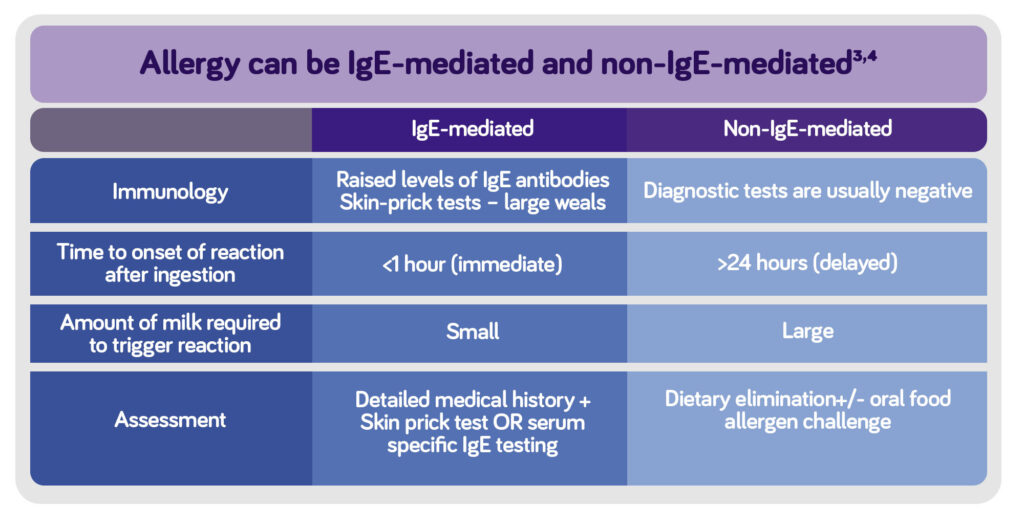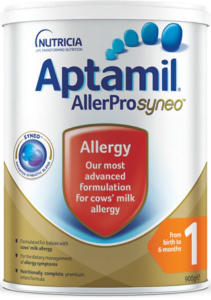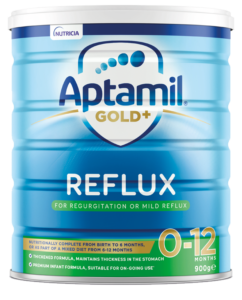The difficult diagnosis: the crossover of symptoms between the delayed reaction to Cows’ Milk Protein (Non-IgE Mediated) and Functional Gastro-Intestinal Disorders in infants.

Cows’ Milk Protein Allergy (CMPA) and symptoms of Functional Gastrointestinal Disorders – such as infantile regurgitation and colic may manifest with similar symptoms in infants which can present challenges to making the correct diagnosis.1
Non-IgE-Mediated Food Allergy
Food allergies are broadly classified into two types:
IgE-mediated allergy is characterised by a rapid onset of an allergic reaction where the immune system reacts by producing antibodies called Immunoglobulin E (IgE).2
Non-IgE-mediated food allergy is less well understood than that of IgE mediated food allergy. A non-IgE-mediated food allergy results in a delayed reaction usually occurring two or more hours after consuming cows’ milk or other dairy foods.2 Reactions often relate to the gastrointestinal tract and can present as symptoms of regurgitation, vomiting, crying, fussiness and poor appetite.1
The lack of tools available to diagnose non-IgE-mediated allergies such as blood or skin prick tests can contribute to a delay in diagnosis.3 Symptoms of regurgitation, vomiting and crying are very common in otherwise healthy infants. Timely and correct diagnosis can have a significant impact on alleviating the unnecessary suffering of both infants and their carers, however, it is just as important not to incorrectly diagnose CMPA as this may have important consequences also.4

Image: Allergy can be IgE-mediated and non-IgE-mediated3,4
Functional Gastrointestinal Disorders
Functional Gastrointestinal Disorders affect 1 in 2 infants with the most common issues being reflux and regurgitation impacting 30% of infants and infantile colic impacting 20% of infants in the first 12 months of life.5
How is non-IgE-mediated food allergy diagnosed?
Due to the lack of diagnostic tools available, a diagnosis must be based on the symptom history and may be confirmed by a period of allergen elimination and reintroduction into the diet i.e. symptoms improve when the suspected food is removed from the diet and return when the food is later reintroduced into the diet.3 The process can take a number of weeks or months to complete properly and is termed the ‘eliminate-rechallenge test’. It is recommended that the process is undertaken with the supervision of an appropriate healthcare professional e.g. dietitian..
Breastfeeding should continue to be encouraged unless otherwise advised by the treating healthcare professional, especially in exclusively breastfeeding mothers.4
FOR HEALTHCARE PROFESSIONALS ONLY
- Salvatore et al. Nutrients 2021, 13, 297. Accessed 22nd July 2021
- https://www.allergy.org.au/patients/food-allergy/faqs
Accessed Sept 06. 2021. - Royal Childrens Hospital Allergy and Immunology - Microsoft Word – Dept Allergy Non IgE Food Allergy patient handout- KA edits (rch.org.au) Accessed Sept 06. 2021.
- The Milk Allergy in Primary Care (MAP) Guideline 2019 | The GP Infant Feeding Network (UK) (gpifn.org.uk) Accessed Sept 06. 2021.
- Vandenplas Y et al. JPGN 2015;61(5):531–537.
Support for you and your patients
Join now and learn about our education events, research initiatives and evidence-based resources – furthering your professional development and clinical practice.
Support for you and your patients
Support for you and your patients
Join now and learn about our education events, research initiatives and evidence-based resources – furthering your professional development and clinical practice.





